Business Law Assignment: UMP Executive Masters, Semester 1, 2019
VerifiedAdded on 2022/10/17
|14
|3645
|242
Homework Assignment
AI Summary
This Business Law assignment solution addresses three key questions. The first question examines a sale of goods scenario, analyzing the obligations of a buyer and seller under CISG when dealing with delayed delivery of rubber containers. The second question delves into contract formation, misrepresentation, and breach of contract, exploring the rights of an applicant when a job offer is retracted before the agreed-upon deadline. The final question analyzes the rights of a party in a complex agreement involving family members and inheritance, focusing on the enforceability of promises and agreements. The assignment covers key legal concepts, including contract law, international sales law, and the elements of a valid agreement, providing a thorough analysis of each scenario.
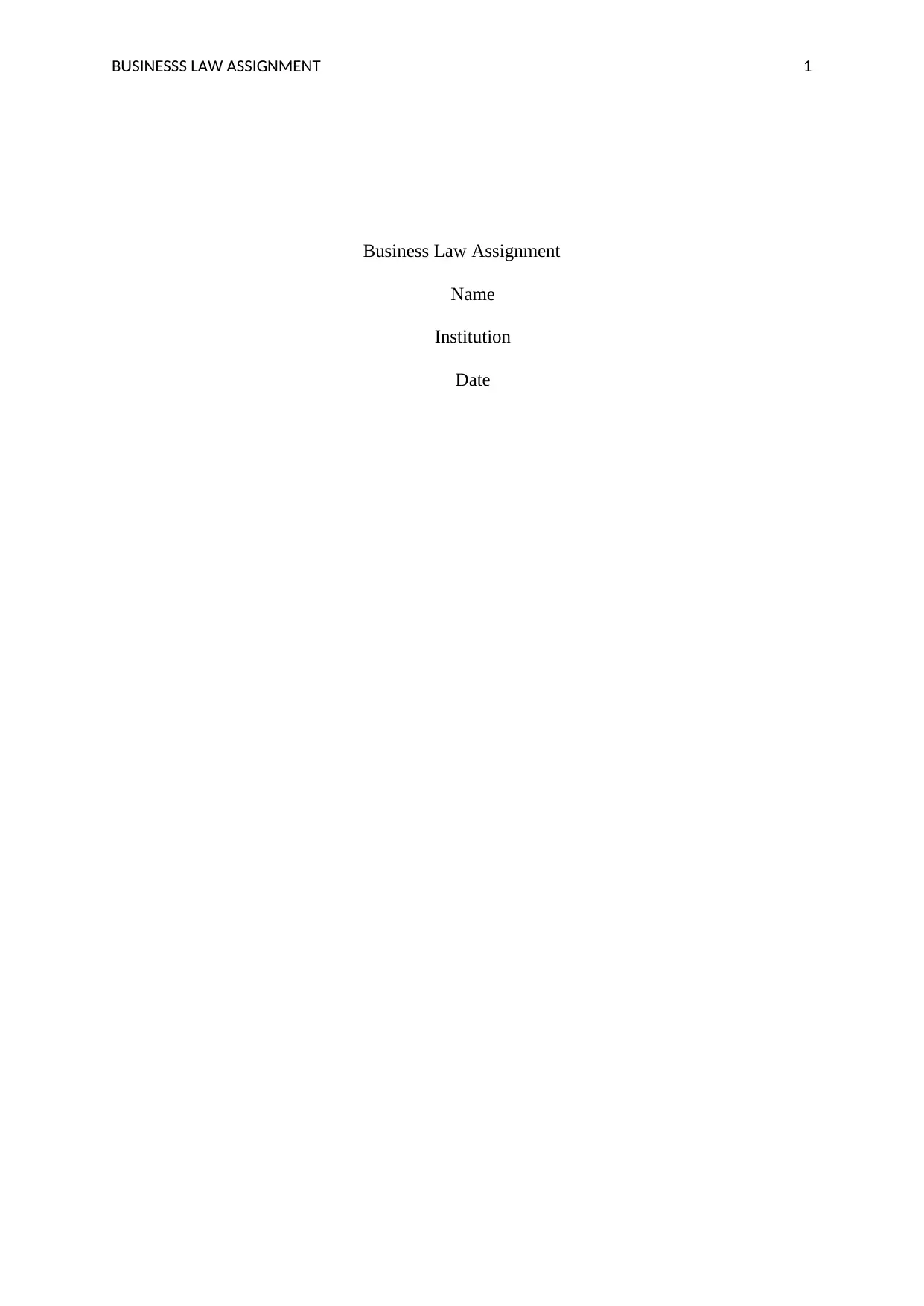
BUSINESSS LAW ASSIGNMENT 1
Business Law Assignment
Name
Institution
Date
Business Law Assignment
Name
Institution
Date
Paraphrase This Document
Need a fresh take? Get an instant paraphrase of this document with our AI Paraphraser
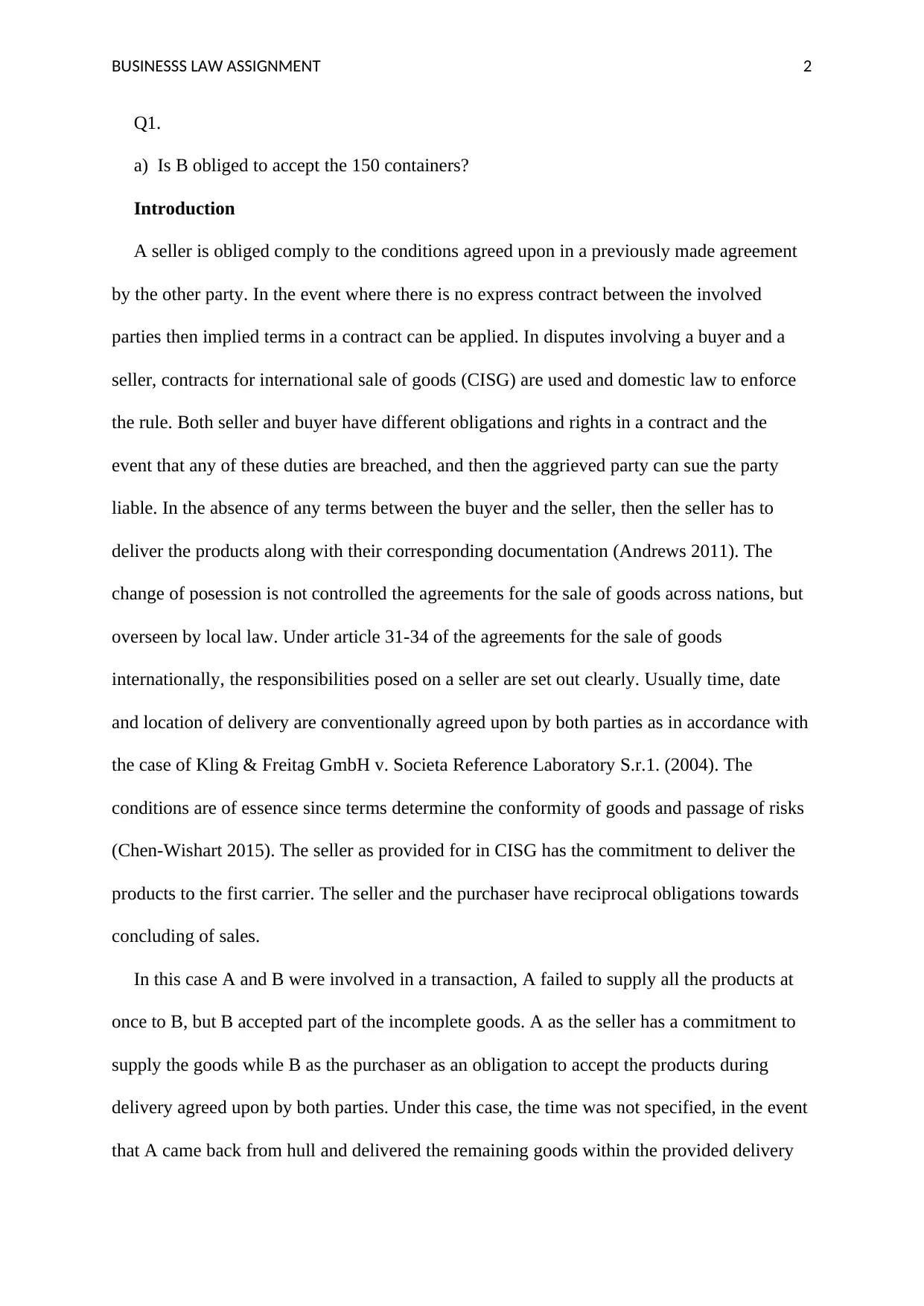
BUSINESSS LAW ASSIGNMENT 2
Q1.
a) Is B obliged to accept the 150 containers?
Introduction
A seller is obliged comply to the conditions agreed upon in a previously made agreement
by the other party. In the event where there is no express contract between the involved
parties then implied terms in a contract can be applied. In disputes involving a buyer and a
seller, contracts for international sale of goods (CISG) are used and domestic law to enforce
the rule. Both seller and buyer have different obligations and rights in a contract and the
event that any of these duties are breached, and then the aggrieved party can sue the party
liable. In the absence of any terms between the buyer and the seller, then the seller has to
deliver the products along with their corresponding documentation (Andrews 2011). The
change of posession is not controlled the agreements for the sale of goods across nations, but
overseen by local law. Under article 31-34 of the agreements for the sale of goods
internationally, the responsibilities posed on a seller are set out clearly. Usually time, date
and location of delivery are conventionally agreed upon by both parties as in accordance with
the case of Kling & Freitag GmbH v. Societa Reference Laboratory S.r.1. (2004). The
conditions are of essence since terms determine the conformity of goods and passage of risks
(Chen-Wishart 2015). The seller as provided for in CISG has the commitment to deliver the
products to the first carrier. The seller and the purchaser have reciprocal obligations towards
concluding of sales.
In this case A and B were involved in a transaction, A failed to supply all the products at
once to B, but B accepted part of the incomplete goods. A as the seller has a commitment to
supply the goods while B as the purchaser as an obligation to accept the products during
delivery agreed upon by both parties. Under this case, the time was not specified, in the event
that A came back from hull and delivered the remaining goods within the provided delivery
Q1.
a) Is B obliged to accept the 150 containers?
Introduction
A seller is obliged comply to the conditions agreed upon in a previously made agreement
by the other party. In the event where there is no express contract between the involved
parties then implied terms in a contract can be applied. In disputes involving a buyer and a
seller, contracts for international sale of goods (CISG) are used and domestic law to enforce
the rule. Both seller and buyer have different obligations and rights in a contract and the
event that any of these duties are breached, and then the aggrieved party can sue the party
liable. In the absence of any terms between the buyer and the seller, then the seller has to
deliver the products along with their corresponding documentation (Andrews 2011). The
change of posession is not controlled the agreements for the sale of goods across nations, but
overseen by local law. Under article 31-34 of the agreements for the sale of goods
internationally, the responsibilities posed on a seller are set out clearly. Usually time, date
and location of delivery are conventionally agreed upon by both parties as in accordance with
the case of Kling & Freitag GmbH v. Societa Reference Laboratory S.r.1. (2004). The
conditions are of essence since terms determine the conformity of goods and passage of risks
(Chen-Wishart 2015). The seller as provided for in CISG has the commitment to deliver the
products to the first carrier. The seller and the purchaser have reciprocal obligations towards
concluding of sales.
In this case A and B were involved in a transaction, A failed to supply all the products at
once to B, but B accepted part of the incomplete goods. A as the seller has a commitment to
supply the goods while B as the purchaser as an obligation to accept the products during
delivery agreed upon by both parties. Under this case, the time was not specified, in the event
that A came back from hull and delivered the remaining goods within the provided delivery
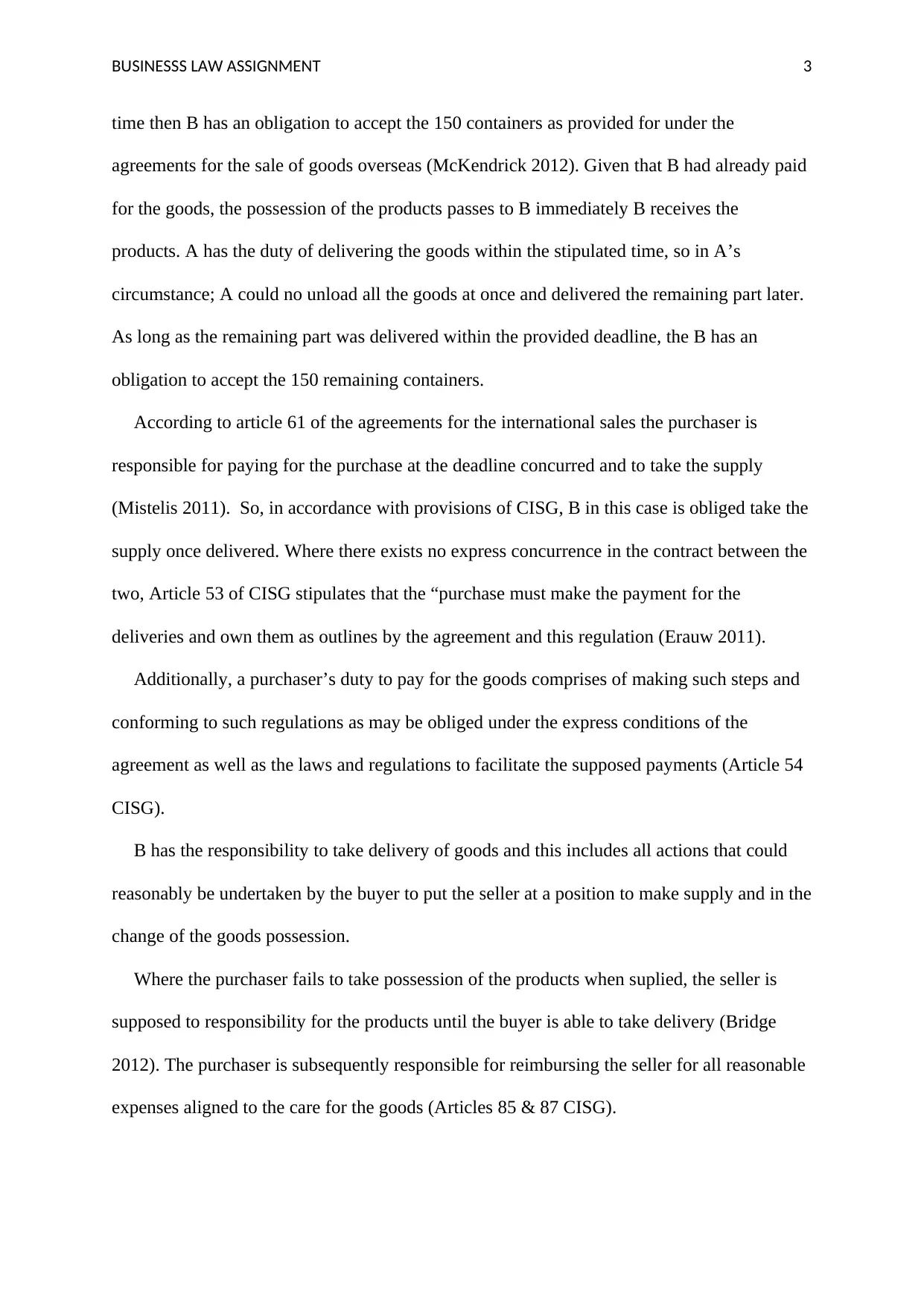
BUSINESSS LAW ASSIGNMENT 3
time then B has an obligation to accept the 150 containers as provided for under the
agreements for the sale of goods overseas (McKendrick 2012). Given that B had already paid
for the goods, the possession of the products passes to B immediately B receives the
products. A has the duty of delivering the goods within the stipulated time, so in A’s
circumstance; A could no unload all the goods at once and delivered the remaining part later.
As long as the remaining part was delivered within the provided deadline, the B has an
obligation to accept the 150 remaining containers.
According to article 61 of the agreements for the international sales the purchaser is
responsible for paying for the purchase at the deadline concurred and to take the supply
(Mistelis 2011). So, in accordance with provisions of CISG, B in this case is obliged take the
supply once delivered. Where there exists no express concurrence in the contract between the
two, Article 53 of CISG stipulates that the “purchase must make the payment for the
deliveries and own them as outlines by the agreement and this regulation (Erauw 2011).
Additionally, a purchaser’s duty to pay for the goods comprises of making such steps and
conforming to such regulations as may be obliged under the express conditions of the
agreement as well as the laws and regulations to facilitate the supposed payments (Article 54
CISG).
B has the responsibility to take delivery of goods and this includes all actions that could
reasonably be undertaken by the buyer to put the seller at a position to make supply and in the
change of the goods possession.
Where the purchaser fails to take possession of the products when suplied, the seller is
supposed to responsibility for the products until the buyer is able to take delivery (Bridge
2012). The purchaser is subsequently responsible for reimbursing the seller for all reasonable
expenses aligned to the care for the goods (Articles 85 & 87 CISG).
time then B has an obligation to accept the 150 containers as provided for under the
agreements for the sale of goods overseas (McKendrick 2012). Given that B had already paid
for the goods, the possession of the products passes to B immediately B receives the
products. A has the duty of delivering the goods within the stipulated time, so in A’s
circumstance; A could no unload all the goods at once and delivered the remaining part later.
As long as the remaining part was delivered within the provided deadline, the B has an
obligation to accept the 150 remaining containers.
According to article 61 of the agreements for the international sales the purchaser is
responsible for paying for the purchase at the deadline concurred and to take the supply
(Mistelis 2011). So, in accordance with provisions of CISG, B in this case is obliged take the
supply once delivered. Where there exists no express concurrence in the contract between the
two, Article 53 of CISG stipulates that the “purchase must make the payment for the
deliveries and own them as outlines by the agreement and this regulation (Erauw 2011).
Additionally, a purchaser’s duty to pay for the goods comprises of making such steps and
conforming to such regulations as may be obliged under the express conditions of the
agreement as well as the laws and regulations to facilitate the supposed payments (Article 54
CISG).
B has the responsibility to take delivery of goods and this includes all actions that could
reasonably be undertaken by the buyer to put the seller at a position to make supply and in the
change of the goods possession.
Where the purchaser fails to take possession of the products when suplied, the seller is
supposed to responsibility for the products until the buyer is able to take delivery (Bridge
2012). The purchaser is subsequently responsible for reimbursing the seller for all reasonable
expenses aligned to the care for the goods (Articles 85 & 87 CISG).
⊘ This is a preview!⊘
Do you want full access?
Subscribe today to unlock all pages.

Trusted by 1+ million students worldwide
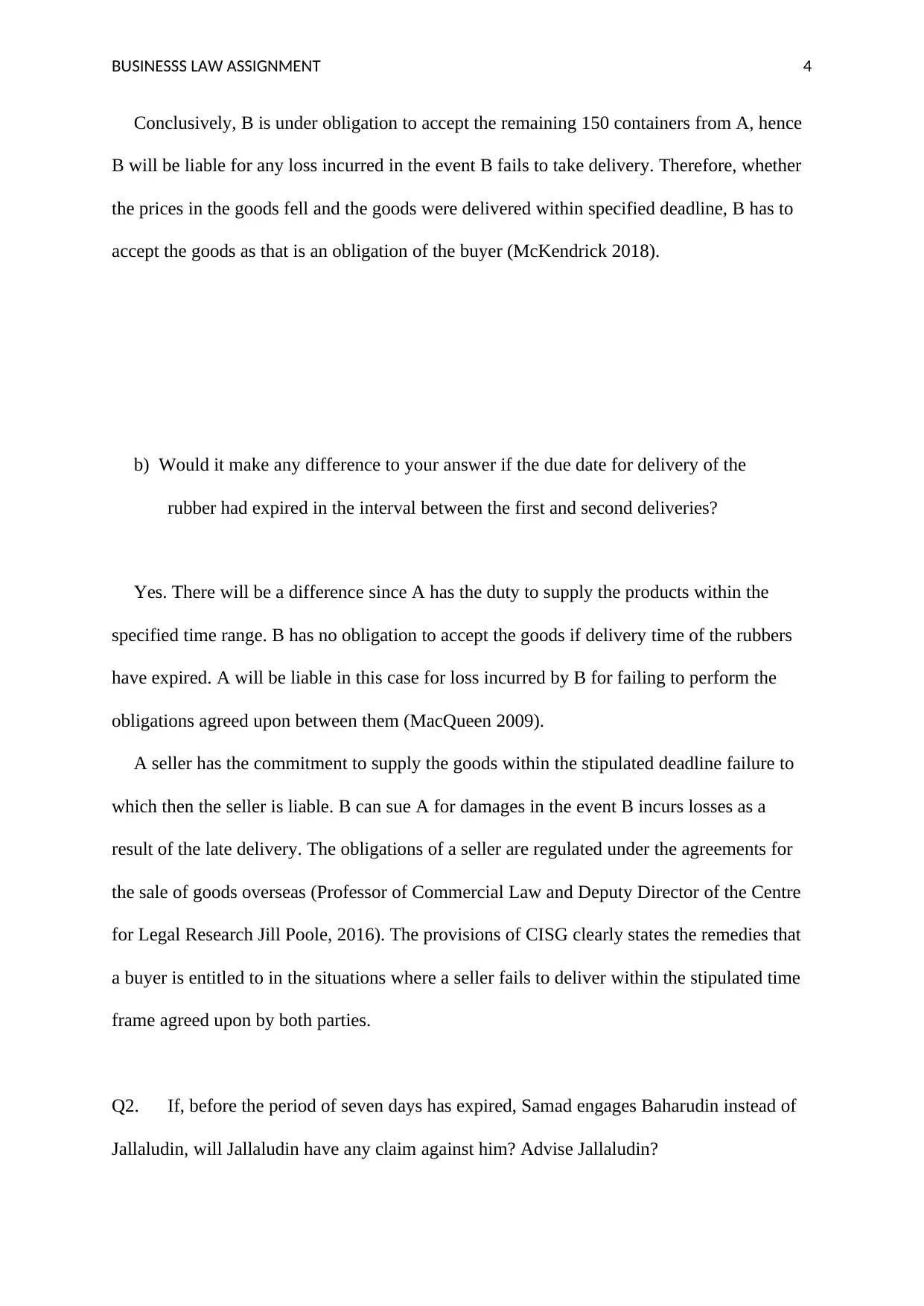
BUSINESSS LAW ASSIGNMENT 4
Conclusively, B is under obligation to accept the remaining 150 containers from A, hence
B will be liable for any loss incurred in the event B fails to take delivery. Therefore, whether
the prices in the goods fell and the goods were delivered within specified deadline, B has to
accept the goods as that is an obligation of the buyer (McKendrick 2018).
b) Would it make any difference to your answer if the due date for delivery of the
rubber had expired in the interval between the first and second deliveries?
Yes. There will be a difference since A has the duty to supply the products within the
specified time range. B has no obligation to accept the goods if delivery time of the rubbers
have expired. A will be liable in this case for loss incurred by B for failing to perform the
obligations agreed upon between them (MacQueen 2009).
A seller has the commitment to supply the goods within the stipulated deadline failure to
which then the seller is liable. B can sue A for damages in the event B incurs losses as a
result of the late delivery. The obligations of a seller are regulated under the agreements for
the sale of goods overseas (Professor of Commercial Law and Deputy Director of the Centre
for Legal Research Jill Poole, 2016). The provisions of CISG clearly states the remedies that
a buyer is entitled to in the situations where a seller fails to deliver within the stipulated time
frame agreed upon by both parties.
Q2. If, before the period of seven days has expired, Samad engages Baharudin instead of
Jallaludin, will Jallaludin have any claim against him? Advise Jallaludin?
Conclusively, B is under obligation to accept the remaining 150 containers from A, hence
B will be liable for any loss incurred in the event B fails to take delivery. Therefore, whether
the prices in the goods fell and the goods were delivered within specified deadline, B has to
accept the goods as that is an obligation of the buyer (McKendrick 2018).
b) Would it make any difference to your answer if the due date for delivery of the
rubber had expired in the interval between the first and second deliveries?
Yes. There will be a difference since A has the duty to supply the products within the
specified time range. B has no obligation to accept the goods if delivery time of the rubbers
have expired. A will be liable in this case for loss incurred by B for failing to perform the
obligations agreed upon between them (MacQueen 2009).
A seller has the commitment to supply the goods within the stipulated deadline failure to
which then the seller is liable. B can sue A for damages in the event B incurs losses as a
result of the late delivery. The obligations of a seller are regulated under the agreements for
the sale of goods overseas (Professor of Commercial Law and Deputy Director of the Centre
for Legal Research Jill Poole, 2016). The provisions of CISG clearly states the remedies that
a buyer is entitled to in the situations where a seller fails to deliver within the stipulated time
frame agreed upon by both parties.
Q2. If, before the period of seven days has expired, Samad engages Baharudin instead of
Jallaludin, will Jallaludin have any claim against him? Advise Jallaludin?
Paraphrase This Document
Need a fresh take? Get an instant paraphrase of this document with our AI Paraphraser
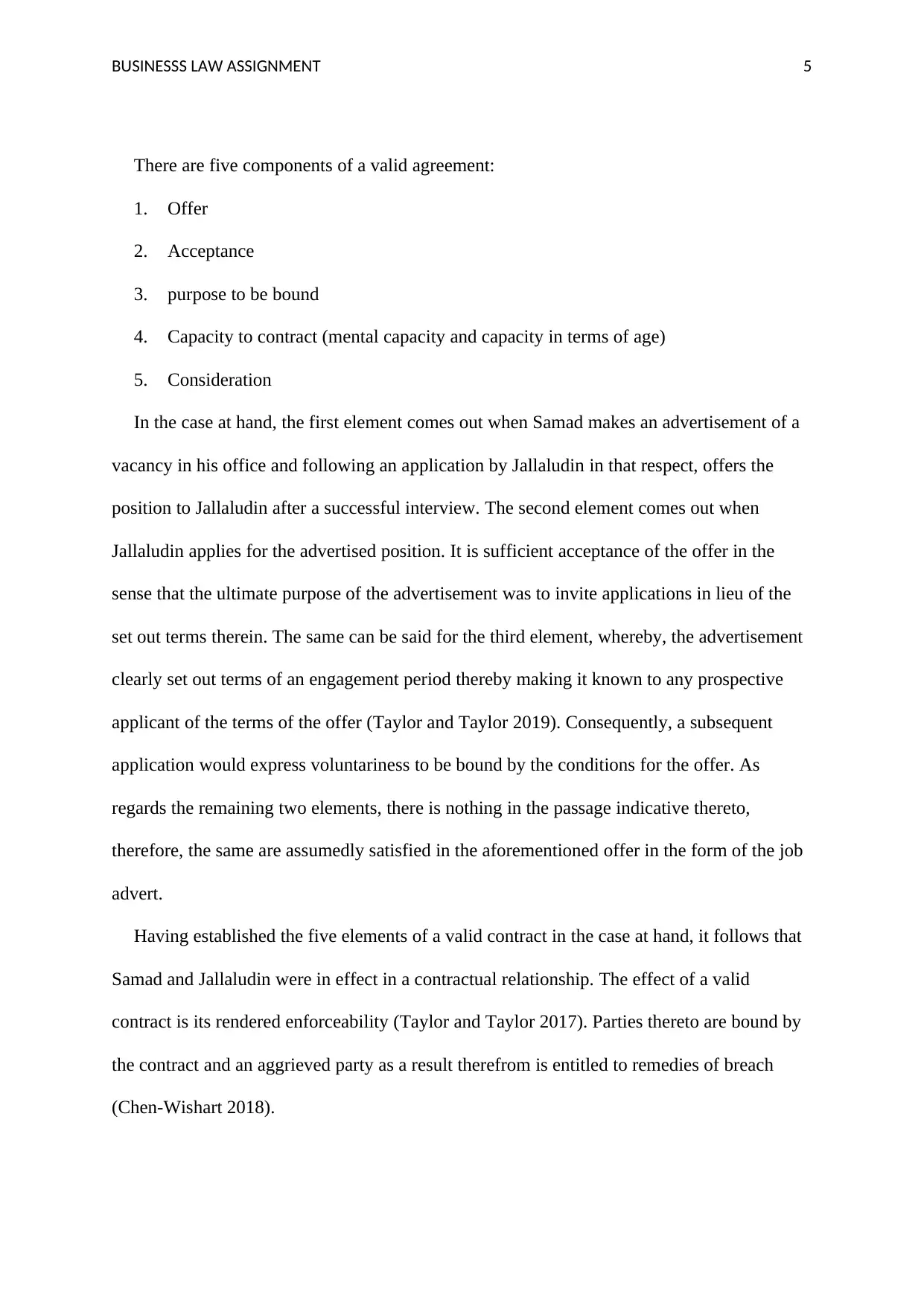
BUSINESSS LAW ASSIGNMENT 5
There are five components of a valid agreement:
1. Offer
2. Acceptance
3. purpose to be bound
4. Capacity to contract (mental capacity and capacity in terms of age)
5. Consideration
In the case at hand, the first element comes out when Samad makes an advertisement of a
vacancy in his office and following an application by Jallaludin in that respect, offers the
position to Jallaludin after a successful interview. The second element comes out when
Jallaludin applies for the advertised position. It is sufficient acceptance of the offer in the
sense that the ultimate purpose of the advertisement was to invite applications in lieu of the
set out terms therein. The same can be said for the third element, whereby, the advertisement
clearly set out terms of an engagement period thereby making it known to any prospective
applicant of the terms of the offer (Taylor and Taylor 2019). Consequently, a subsequent
application would express voluntariness to be bound by the conditions for the offer. As
regards the remaining two elements, there is nothing in the passage indicative thereto,
therefore, the same are assumedly satisfied in the aforementioned offer in the form of the job
advert.
Having established the five elements of a valid contract in the case at hand, it follows that
Samad and Jallaludin were in effect in a contractual relationship. The effect of a valid
contract is its rendered enforceability (Taylor and Taylor 2017). Parties thereto are bound by
the contract and an aggrieved party as a result therefrom is entitled to remedies of breach
(Chen-Wishart 2018).
There are five components of a valid agreement:
1. Offer
2. Acceptance
3. purpose to be bound
4. Capacity to contract (mental capacity and capacity in terms of age)
5. Consideration
In the case at hand, the first element comes out when Samad makes an advertisement of a
vacancy in his office and following an application by Jallaludin in that respect, offers the
position to Jallaludin after a successful interview. The second element comes out when
Jallaludin applies for the advertised position. It is sufficient acceptance of the offer in the
sense that the ultimate purpose of the advertisement was to invite applications in lieu of the
set out terms therein. The same can be said for the third element, whereby, the advertisement
clearly set out terms of an engagement period thereby making it known to any prospective
applicant of the terms of the offer (Taylor and Taylor 2019). Consequently, a subsequent
application would express voluntariness to be bound by the conditions for the offer. As
regards the remaining two elements, there is nothing in the passage indicative thereto,
therefore, the same are assumedly satisfied in the aforementioned offer in the form of the job
advert.
Having established the five elements of a valid contract in the case at hand, it follows that
Samad and Jallaludin were in effect in a contractual relationship. The effect of a valid
contract is its rendered enforceability (Taylor and Taylor 2017). Parties thereto are bound by
the contract and an aggrieved party as a result therefrom is entitled to remedies of breach
(Chen-Wishart 2018).
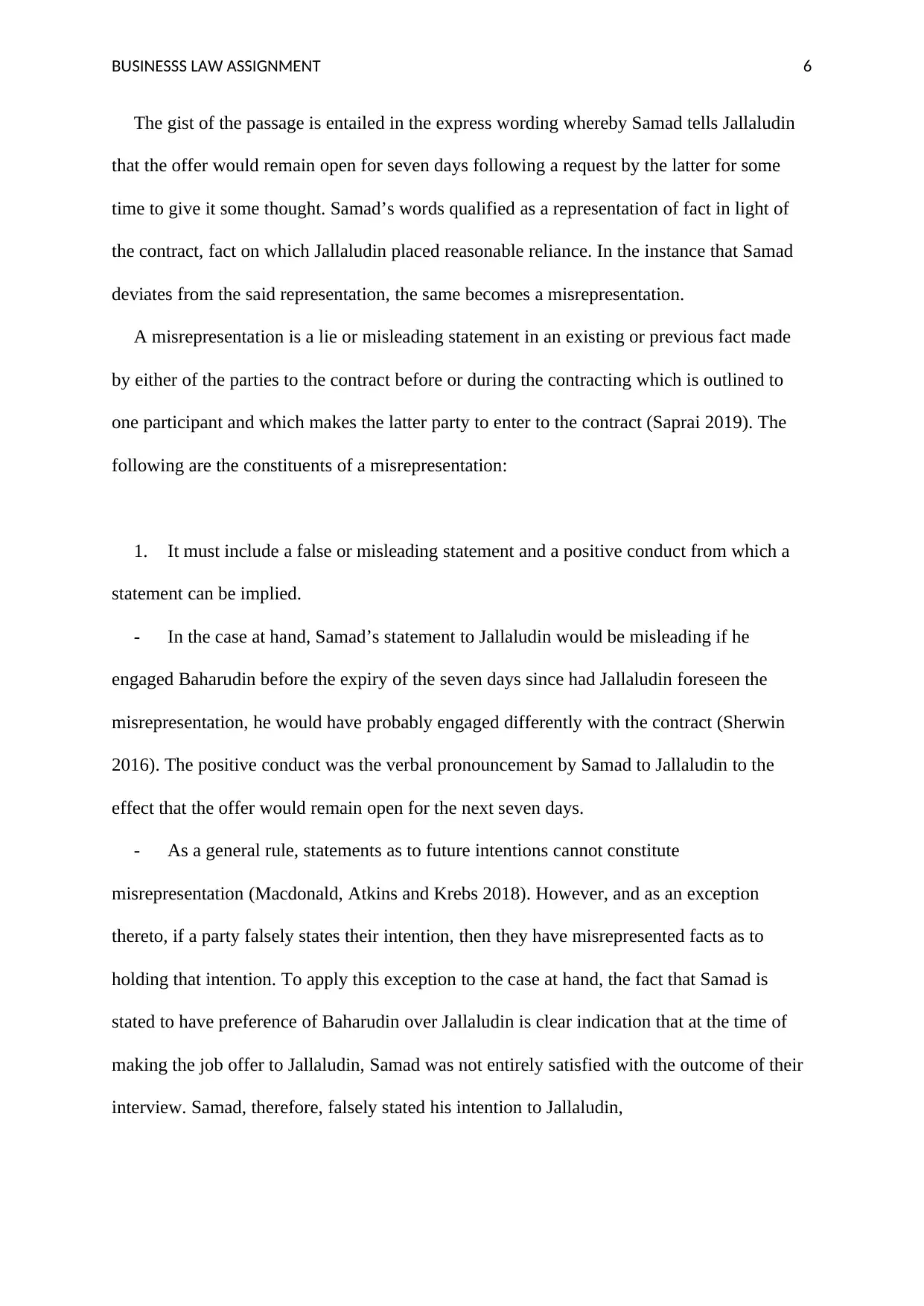
BUSINESSS LAW ASSIGNMENT 6
The gist of the passage is entailed in the express wording whereby Samad tells Jallaludin
that the offer would remain open for seven days following a request by the latter for some
time to give it some thought. Samad’s words qualified as a representation of fact in light of
the contract, fact on which Jallaludin placed reasonable reliance. In the instance that Samad
deviates from the said representation, the same becomes a misrepresentation.
A misrepresentation is a lie or misleading statement in an existing or previous fact made
by either of the parties to the contract before or during the contracting which is outlined to
one participant and which makes the latter party to enter to the contract (Saprai 2019). The
following are the constituents of a misrepresentation:
1. It must include a false or misleading statement and a positive conduct from which a
statement can be implied.
- In the case at hand, Samad’s statement to Jallaludin would be misleading if he
engaged Baharudin before the expiry of the seven days since had Jallaludin foreseen the
misrepresentation, he would have probably engaged differently with the contract (Sherwin
2016). The positive conduct was the verbal pronouncement by Samad to Jallaludin to the
effect that the offer would remain open for the next seven days.
- As a general rule, statements as to future intentions cannot constitute
misrepresentation (Macdonald, Atkins and Krebs 2018). However, and as an exception
thereto, if a party falsely states their intention, then they have misrepresented facts as to
holding that intention. To apply this exception to the case at hand, the fact that Samad is
stated to have preference of Baharudin over Jallaludin is clear indication that at the time of
making the job offer to Jallaludin, Samad was not entirely satisfied with the outcome of their
interview. Samad, therefore, falsely stated his intention to Jallaludin,
The gist of the passage is entailed in the express wording whereby Samad tells Jallaludin
that the offer would remain open for seven days following a request by the latter for some
time to give it some thought. Samad’s words qualified as a representation of fact in light of
the contract, fact on which Jallaludin placed reasonable reliance. In the instance that Samad
deviates from the said representation, the same becomes a misrepresentation.
A misrepresentation is a lie or misleading statement in an existing or previous fact made
by either of the parties to the contract before or during the contracting which is outlined to
one participant and which makes the latter party to enter to the contract (Saprai 2019). The
following are the constituents of a misrepresentation:
1. It must include a false or misleading statement and a positive conduct from which a
statement can be implied.
- In the case at hand, Samad’s statement to Jallaludin would be misleading if he
engaged Baharudin before the expiry of the seven days since had Jallaludin foreseen the
misrepresentation, he would have probably engaged differently with the contract (Sherwin
2016). The positive conduct was the verbal pronouncement by Samad to Jallaludin to the
effect that the offer would remain open for the next seven days.
- As a general rule, statements as to future intentions cannot constitute
misrepresentation (Macdonald, Atkins and Krebs 2018). However, and as an exception
thereto, if a party falsely states their intention, then they have misrepresented facts as to
holding that intention. To apply this exception to the case at hand, the fact that Samad is
stated to have preference of Baharudin over Jallaludin is clear indication that at the time of
making the job offer to Jallaludin, Samad was not entirely satisfied with the outcome of their
interview. Samad, therefore, falsely stated his intention to Jallaludin,
⊘ This is a preview!⊘
Do you want full access?
Subscribe today to unlock all pages.

Trusted by 1+ million students worldwide
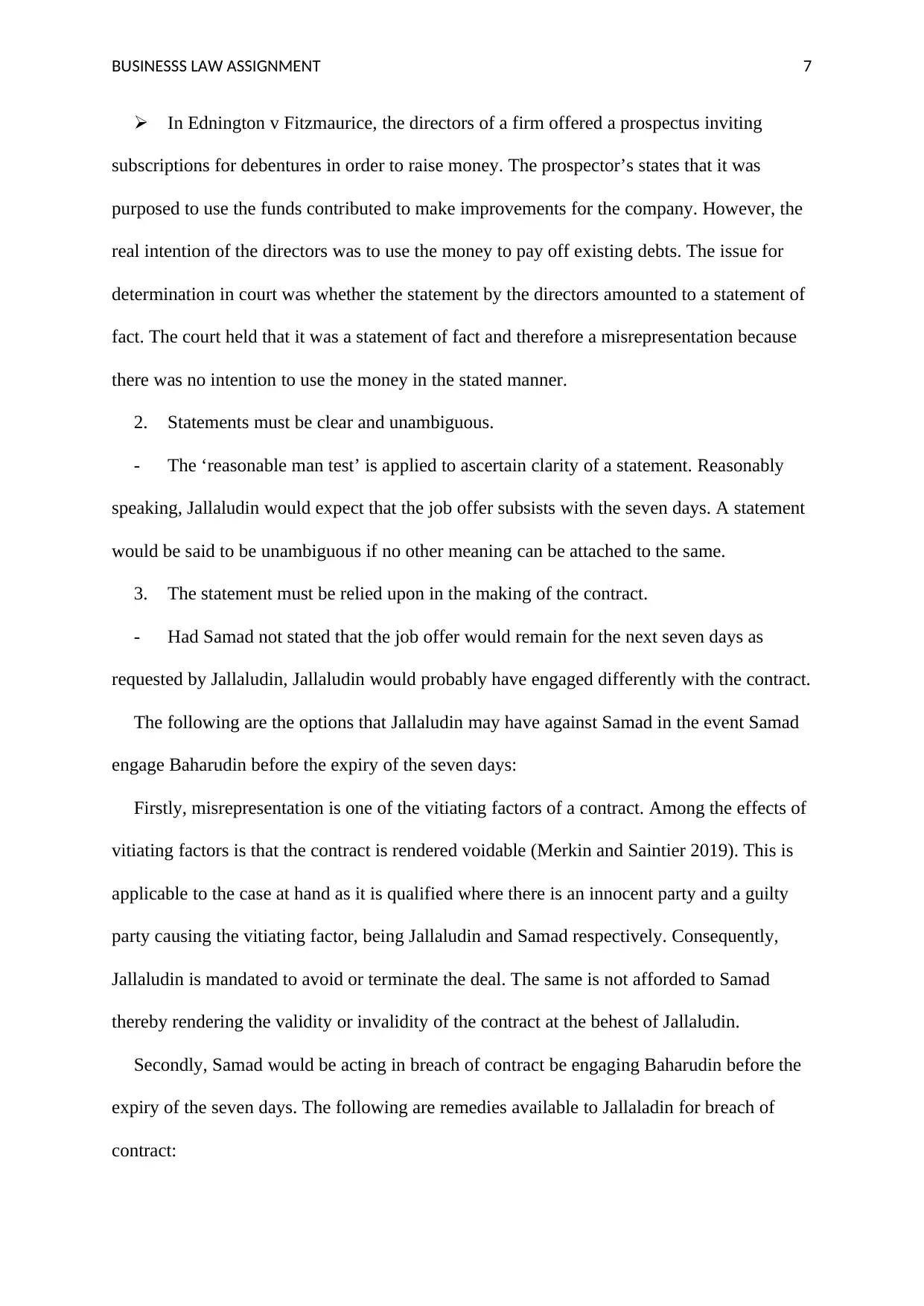
BUSINESSS LAW ASSIGNMENT 7
In Ednington v Fitzmaurice, the directors of a firm offered a prospectus inviting
subscriptions for debentures in order to raise money. The prospector’s states that it was
purposed to use the funds contributed to make improvements for the company. However, the
real intention of the directors was to use the money to pay off existing debts. The issue for
determination in court was whether the statement by the directors amounted to a statement of
fact. The court held that it was a statement of fact and therefore a misrepresentation because
there was no intention to use the money in the stated manner.
2. Statements must be clear and unambiguous.
- The ‘reasonable man test’ is applied to ascertain clarity of a statement. Reasonably
speaking, Jallaludin would expect that the job offer subsists with the seven days. A statement
would be said to be unambiguous if no other meaning can be attached to the same.
3. The statement must be relied upon in the making of the contract.
- Had Samad not stated that the job offer would remain for the next seven days as
requested by Jallaludin, Jallaludin would probably have engaged differently with the contract.
The following are the options that Jallaludin may have against Samad in the event Samad
engage Baharudin before the expiry of the seven days:
Firstly, misrepresentation is one of the vitiating factors of a contract. Among the effects of
vitiating factors is that the contract is rendered voidable (Merkin and Saintier 2019). This is
applicable to the case at hand as it is qualified where there is an innocent party and a guilty
party causing the vitiating factor, being Jallaludin and Samad respectively. Consequently,
Jallaludin is mandated to avoid or terminate the deal. The same is not afforded to Samad
thereby rendering the validity or invalidity of the contract at the behest of Jallaludin.
Secondly, Samad would be acting in breach of contract be engaging Baharudin before the
expiry of the seven days. The following are remedies available to Jallaladin for breach of
contract:
In Ednington v Fitzmaurice, the directors of a firm offered a prospectus inviting
subscriptions for debentures in order to raise money. The prospector’s states that it was
purposed to use the funds contributed to make improvements for the company. However, the
real intention of the directors was to use the money to pay off existing debts. The issue for
determination in court was whether the statement by the directors amounted to a statement of
fact. The court held that it was a statement of fact and therefore a misrepresentation because
there was no intention to use the money in the stated manner.
2. Statements must be clear and unambiguous.
- The ‘reasonable man test’ is applied to ascertain clarity of a statement. Reasonably
speaking, Jallaludin would expect that the job offer subsists with the seven days. A statement
would be said to be unambiguous if no other meaning can be attached to the same.
3. The statement must be relied upon in the making of the contract.
- Had Samad not stated that the job offer would remain for the next seven days as
requested by Jallaludin, Jallaludin would probably have engaged differently with the contract.
The following are the options that Jallaludin may have against Samad in the event Samad
engage Baharudin before the expiry of the seven days:
Firstly, misrepresentation is one of the vitiating factors of a contract. Among the effects of
vitiating factors is that the contract is rendered voidable (Merkin and Saintier 2019). This is
applicable to the case at hand as it is qualified where there is an innocent party and a guilty
party causing the vitiating factor, being Jallaludin and Samad respectively. Consequently,
Jallaludin is mandated to avoid or terminate the deal. The same is not afforded to Samad
thereby rendering the validity or invalidity of the contract at the behest of Jallaludin.
Secondly, Samad would be acting in breach of contract be engaging Baharudin before the
expiry of the seven days. The following are remedies available to Jallaladin for breach of
contract:
Paraphrase This Document
Need a fresh take? Get an instant paraphrase of this document with our AI Paraphraser
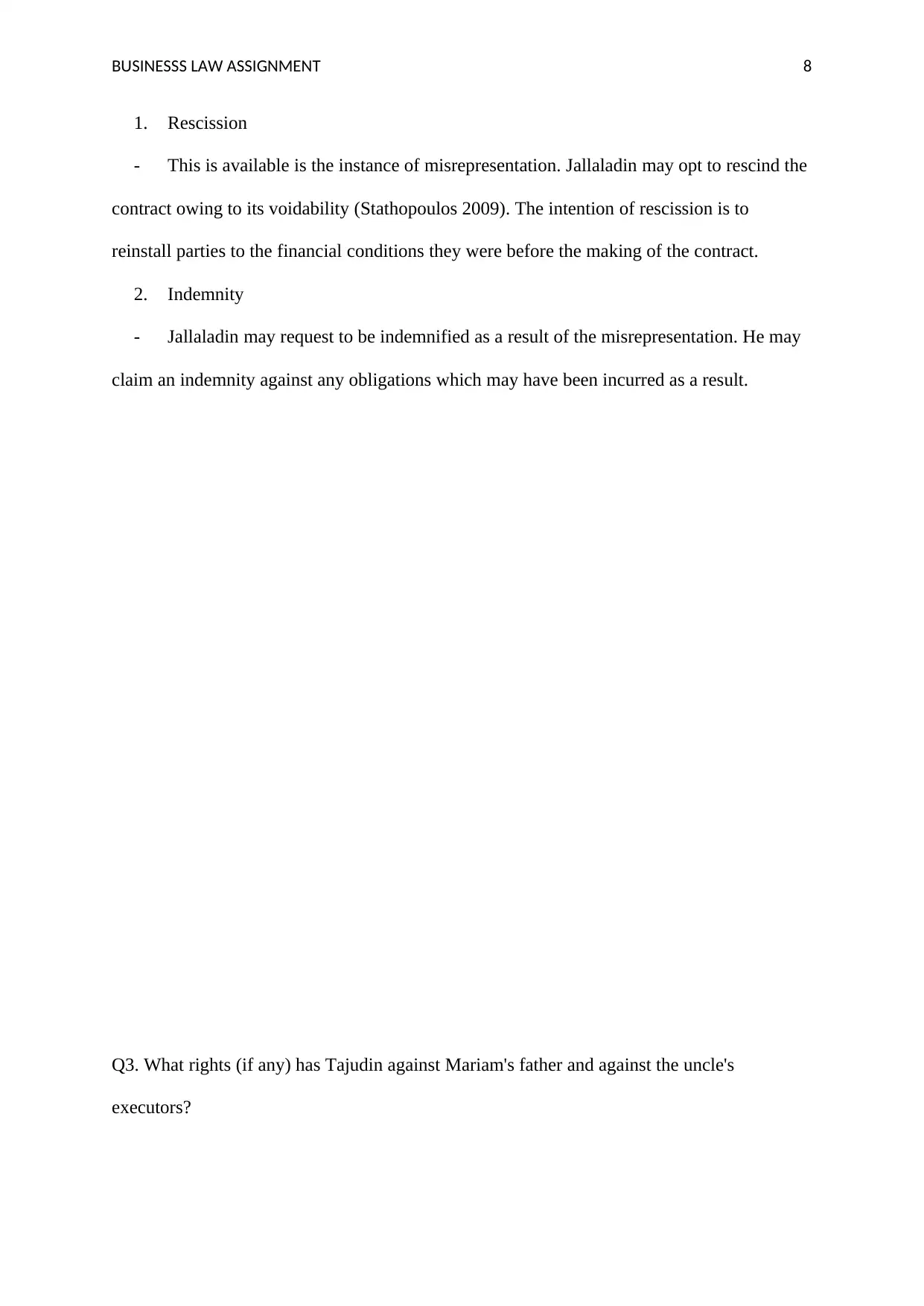
BUSINESSS LAW ASSIGNMENT 8
1. Rescission
- This is available is the instance of misrepresentation. Jallaladin may opt to rescind the
contract owing to its voidability (Stathopoulos 2009). The intention of rescission is to
reinstall parties to the financial conditions they were before the making of the contract.
2. Indemnity
- Jallaladin may request to be indemnified as a result of the misrepresentation. He may
claim an indemnity against any obligations which may have been incurred as a result.
Q3. What rights (if any) has Tajudin against Mariam's father and against the uncle's
executors?
1. Rescission
- This is available is the instance of misrepresentation. Jallaladin may opt to rescind the
contract owing to its voidability (Stathopoulos 2009). The intention of rescission is to
reinstall parties to the financial conditions they were before the making of the contract.
2. Indemnity
- Jallaladin may request to be indemnified as a result of the misrepresentation. He may
claim an indemnity against any obligations which may have been incurred as a result.
Q3. What rights (if any) has Tajudin against Mariam's father and against the uncle's
executors?
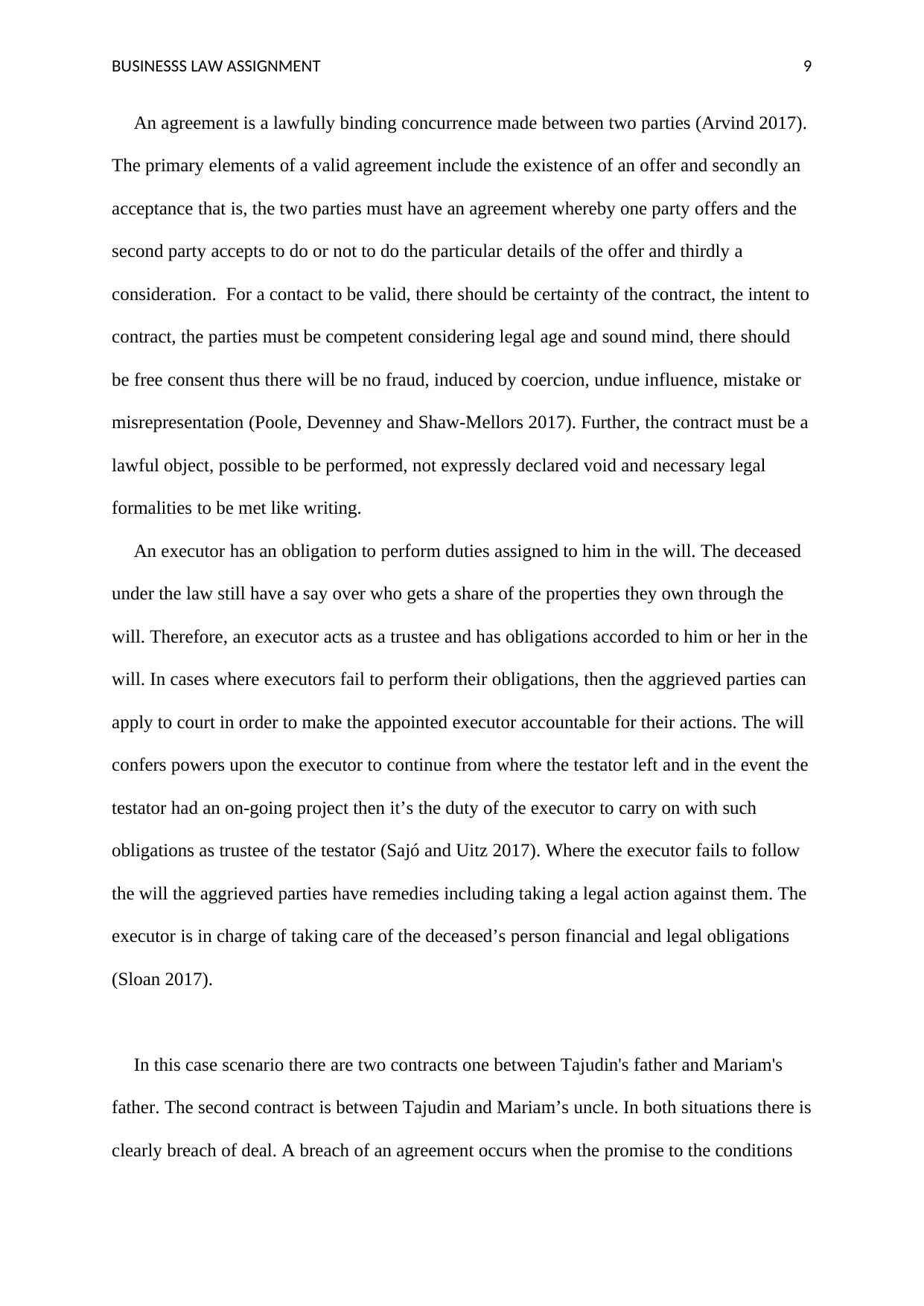
BUSINESSS LAW ASSIGNMENT 9
An agreement is a lawfully binding concurrence made between two parties (Arvind 2017).
The primary elements of a valid agreement include the existence of an offer and secondly an
acceptance that is, the two parties must have an agreement whereby one party offers and the
second party accepts to do or not to do the particular details of the offer and thirdly a
consideration. For a contact to be valid, there should be certainty of the contract, the intent to
contract, the parties must be competent considering legal age and sound mind, there should
be free consent thus there will be no fraud, induced by coercion, undue influence, mistake or
misrepresentation (Poole, Devenney and Shaw-Mellors 2017). Further, the contract must be a
lawful object, possible to be performed, not expressly declared void and necessary legal
formalities to be met like writing.
An executor has an obligation to perform duties assigned to him in the will. The deceased
under the law still have a say over who gets a share of the properties they own through the
will. Therefore, an executor acts as a trustee and has obligations accorded to him or her in the
will. In cases where executors fail to perform their obligations, then the aggrieved parties can
apply to court in order to make the appointed executor accountable for their actions. The will
confers powers upon the executor to continue from where the testator left and in the event the
testator had an on-going project then it’s the duty of the executor to carry on with such
obligations as trustee of the testator (Sajó and Uitz 2017). Where the executor fails to follow
the will the aggrieved parties have remedies including taking a legal action against them. The
executor is in charge of taking care of the deceased’s person financial and legal obligations
(Sloan 2017).
In this case scenario there are two contracts one between Tajudin's father and Mariam's
father. The second contract is between Tajudin and Mariam’s uncle. In both situations there is
clearly breach of deal. A breach of an agreement occurs when the promise to the conditions
An agreement is a lawfully binding concurrence made between two parties (Arvind 2017).
The primary elements of a valid agreement include the existence of an offer and secondly an
acceptance that is, the two parties must have an agreement whereby one party offers and the
second party accepts to do or not to do the particular details of the offer and thirdly a
consideration. For a contact to be valid, there should be certainty of the contract, the intent to
contract, the parties must be competent considering legal age and sound mind, there should
be free consent thus there will be no fraud, induced by coercion, undue influence, mistake or
misrepresentation (Poole, Devenney and Shaw-Mellors 2017). Further, the contract must be a
lawful object, possible to be performed, not expressly declared void and necessary legal
formalities to be met like writing.
An executor has an obligation to perform duties assigned to him in the will. The deceased
under the law still have a say over who gets a share of the properties they own through the
will. Therefore, an executor acts as a trustee and has obligations accorded to him or her in the
will. In cases where executors fail to perform their obligations, then the aggrieved parties can
apply to court in order to make the appointed executor accountable for their actions. The will
confers powers upon the executor to continue from where the testator left and in the event the
testator had an on-going project then it’s the duty of the executor to carry on with such
obligations as trustee of the testator (Sajó and Uitz 2017). Where the executor fails to follow
the will the aggrieved parties have remedies including taking a legal action against them. The
executor is in charge of taking care of the deceased’s person financial and legal obligations
(Sloan 2017).
In this case scenario there are two contracts one between Tajudin's father and Mariam's
father. The second contract is between Tajudin and Mariam’s uncle. In both situations there is
clearly breach of deal. A breach of an agreement occurs when the promise to the conditions
⊘ This is a preview!⊘
Do you want full access?
Subscribe today to unlock all pages.

Trusted by 1+ million students worldwide
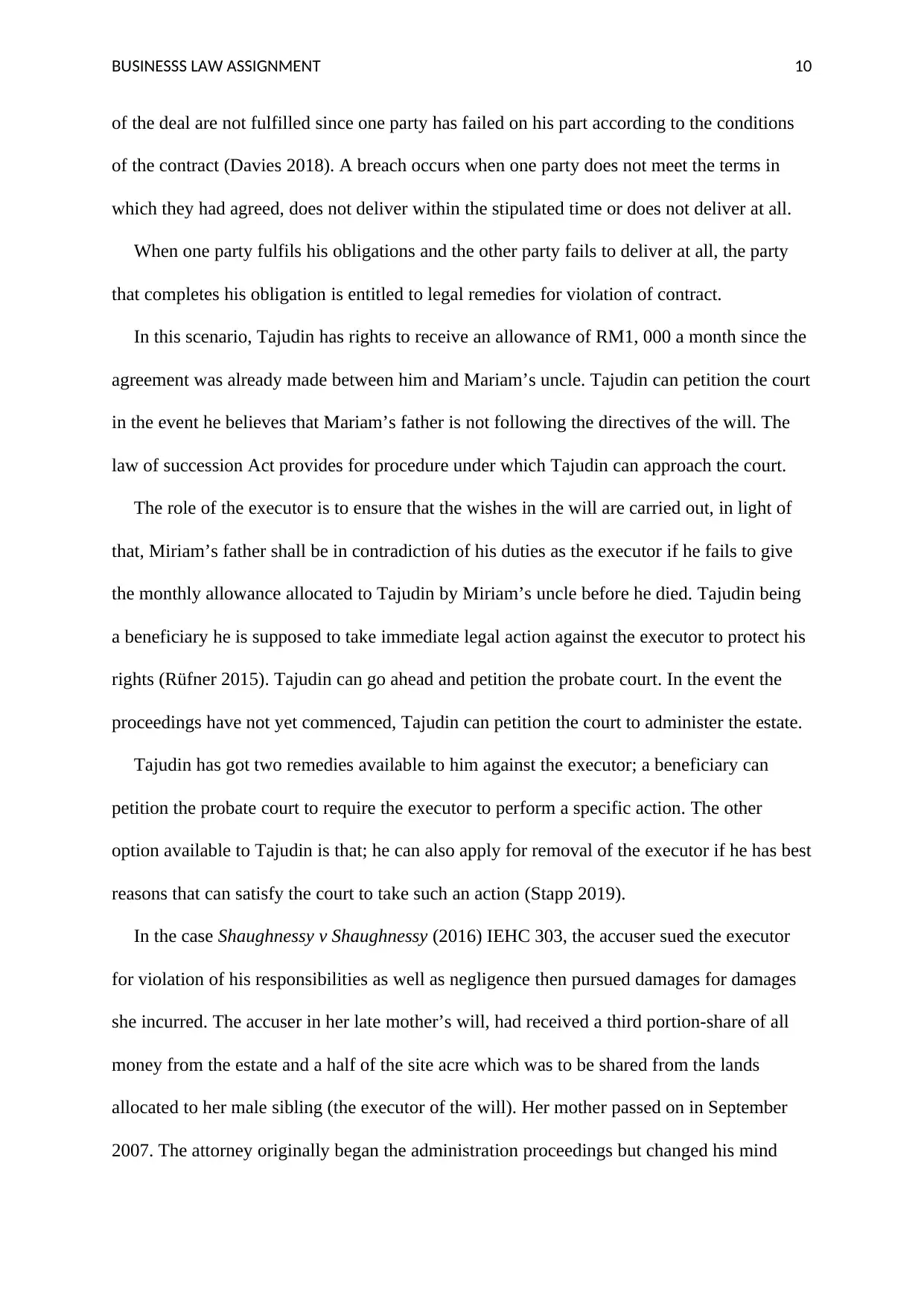
BUSINESSS LAW ASSIGNMENT 10
of the deal are not fulfilled since one party has failed on his part according to the conditions
of the contract (Davies 2018). A breach occurs when one party does not meet the terms in
which they had agreed, does not deliver within the stipulated time or does not deliver at all.
When one party fulfils his obligations and the other party fails to deliver at all, the party
that completes his obligation is entitled to legal remedies for violation of contract.
In this scenario, Tajudin has rights to receive an allowance of RM1, 000 a month since the
agreement was already made between him and Mariam’s uncle. Tajudin can petition the court
in the event he believes that Mariam’s father is not following the directives of the will. The
law of succession Act provides for procedure under which Tajudin can approach the court.
The role of the executor is to ensure that the wishes in the will are carried out, in light of
that, Miriam’s father shall be in contradiction of his duties as the executor if he fails to give
the monthly allowance allocated to Tajudin by Miriam’s uncle before he died. Tajudin being
a beneficiary he is supposed to take immediate legal action against the executor to protect his
rights (Rüfner 2015). Tajudin can go ahead and petition the probate court. In the event the
proceedings have not yet commenced, Tajudin can petition the court to administer the estate.
Tajudin has got two remedies available to him against the executor; a beneficiary can
petition the probate court to require the executor to perform a specific action. The other
option available to Tajudin is that; he can also apply for removal of the executor if he has best
reasons that can satisfy the court to take such an action (Stapp 2019).
In the case Shaughnessy v Shaughnessy (2016) IEHC 303, the accuser sued the executor
for violation of his responsibilities as well as negligence then pursued damages for damages
she incurred. The accuser in her late mother’s will, had received a third portion-share of all
money from the estate and a half of the site acre which was to be shared from the lands
allocated to her male sibling (the executor of the will). Her mother passed on in September
2007. The attorney originally began the administration proceedings but changed his mind
of the deal are not fulfilled since one party has failed on his part according to the conditions
of the contract (Davies 2018). A breach occurs when one party does not meet the terms in
which they had agreed, does not deliver within the stipulated time or does not deliver at all.
When one party fulfils his obligations and the other party fails to deliver at all, the party
that completes his obligation is entitled to legal remedies for violation of contract.
In this scenario, Tajudin has rights to receive an allowance of RM1, 000 a month since the
agreement was already made between him and Mariam’s uncle. Tajudin can petition the court
in the event he believes that Mariam’s father is not following the directives of the will. The
law of succession Act provides for procedure under which Tajudin can approach the court.
The role of the executor is to ensure that the wishes in the will are carried out, in light of
that, Miriam’s father shall be in contradiction of his duties as the executor if he fails to give
the monthly allowance allocated to Tajudin by Miriam’s uncle before he died. Tajudin being
a beneficiary he is supposed to take immediate legal action against the executor to protect his
rights (Rüfner 2015). Tajudin can go ahead and petition the probate court. In the event the
proceedings have not yet commenced, Tajudin can petition the court to administer the estate.
Tajudin has got two remedies available to him against the executor; a beneficiary can
petition the probate court to require the executor to perform a specific action. The other
option available to Tajudin is that; he can also apply for removal of the executor if he has best
reasons that can satisfy the court to take such an action (Stapp 2019).
In the case Shaughnessy v Shaughnessy (2016) IEHC 303, the accuser sued the executor
for violation of his responsibilities as well as negligence then pursued damages for damages
she incurred. The accuser in her late mother’s will, had received a third portion-share of all
money from the estate and a half of the site acre which was to be shared from the lands
allocated to her male sibling (the executor of the will). Her mother passed on in September
2007. The attorney originally began the administration proceedings but changed his mind
Paraphrase This Document
Need a fresh take? Get an instant paraphrase of this document with our AI Paraphraser
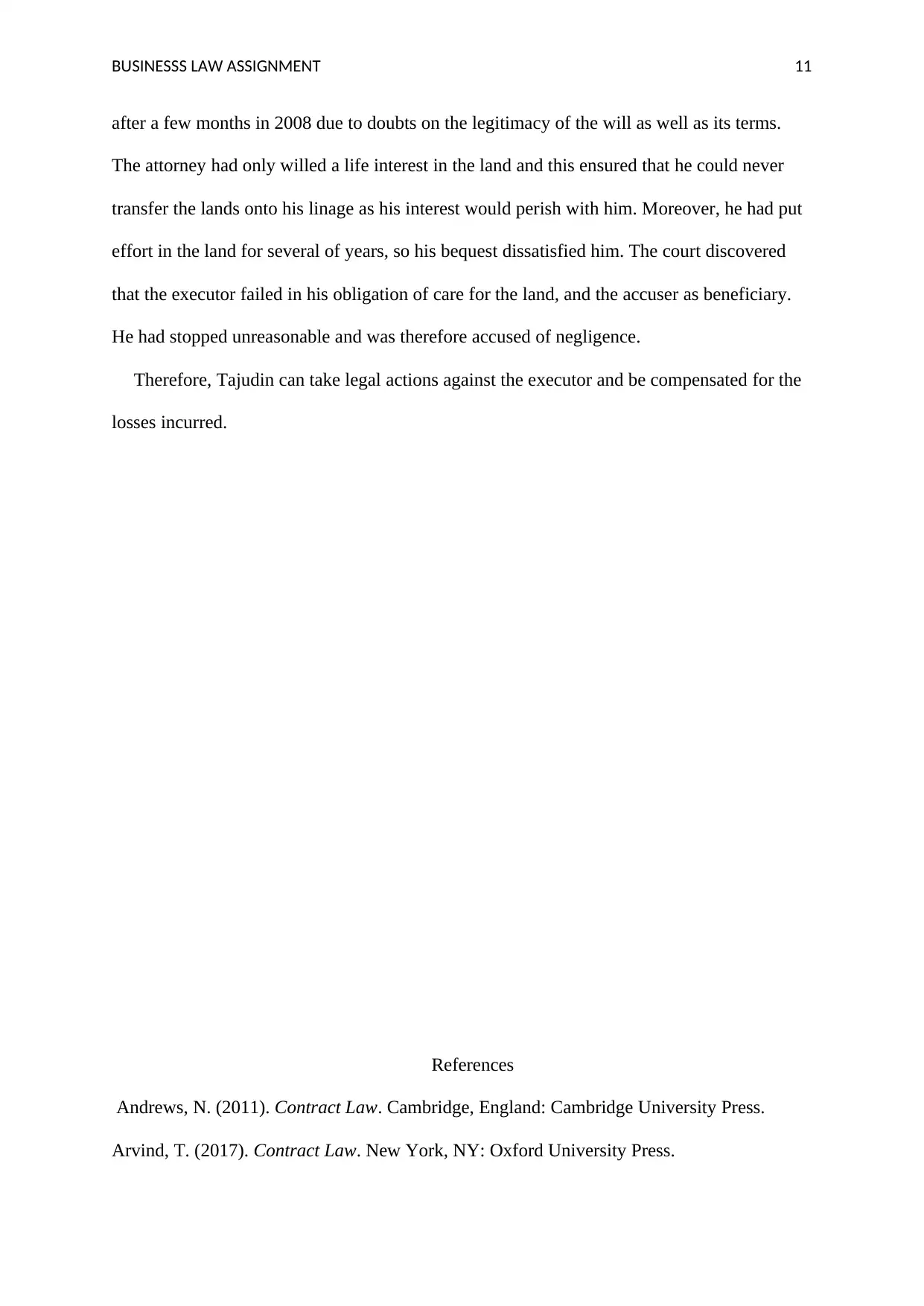
BUSINESSS LAW ASSIGNMENT 11
after a few months in 2008 due to doubts on the legitimacy of the will as well as its terms.
The attorney had only willed a life interest in the land and this ensured that he could never
transfer the lands onto his linage as his interest would perish with him. Moreover, he had put
effort in the land for several of years, so his bequest dissatisfied him. The court discovered
that the executor failed in his obligation of care for the land, and the accuser as beneficiary.
He had stopped unreasonable and was therefore accused of negligence.
Therefore, Tajudin can take legal actions against the executor and be compensated for the
losses incurred.
References
Andrews, N. (2011). Contract Law. Cambridge, England: Cambridge University Press.
Arvind, T. (2017). Contract Law. New York, NY: Oxford University Press.
after a few months in 2008 due to doubts on the legitimacy of the will as well as its terms.
The attorney had only willed a life interest in the land and this ensured that he could never
transfer the lands onto his linage as his interest would perish with him. Moreover, he had put
effort in the land for several of years, so his bequest dissatisfied him. The court discovered
that the executor failed in his obligation of care for the land, and the accuser as beneficiary.
He had stopped unreasonable and was therefore accused of negligence.
Therefore, Tajudin can take legal actions against the executor and be compensated for the
losses incurred.
References
Andrews, N. (2011). Contract Law. Cambridge, England: Cambridge University Press.
Arvind, T. (2017). Contract Law. New York, NY: Oxford University Press.
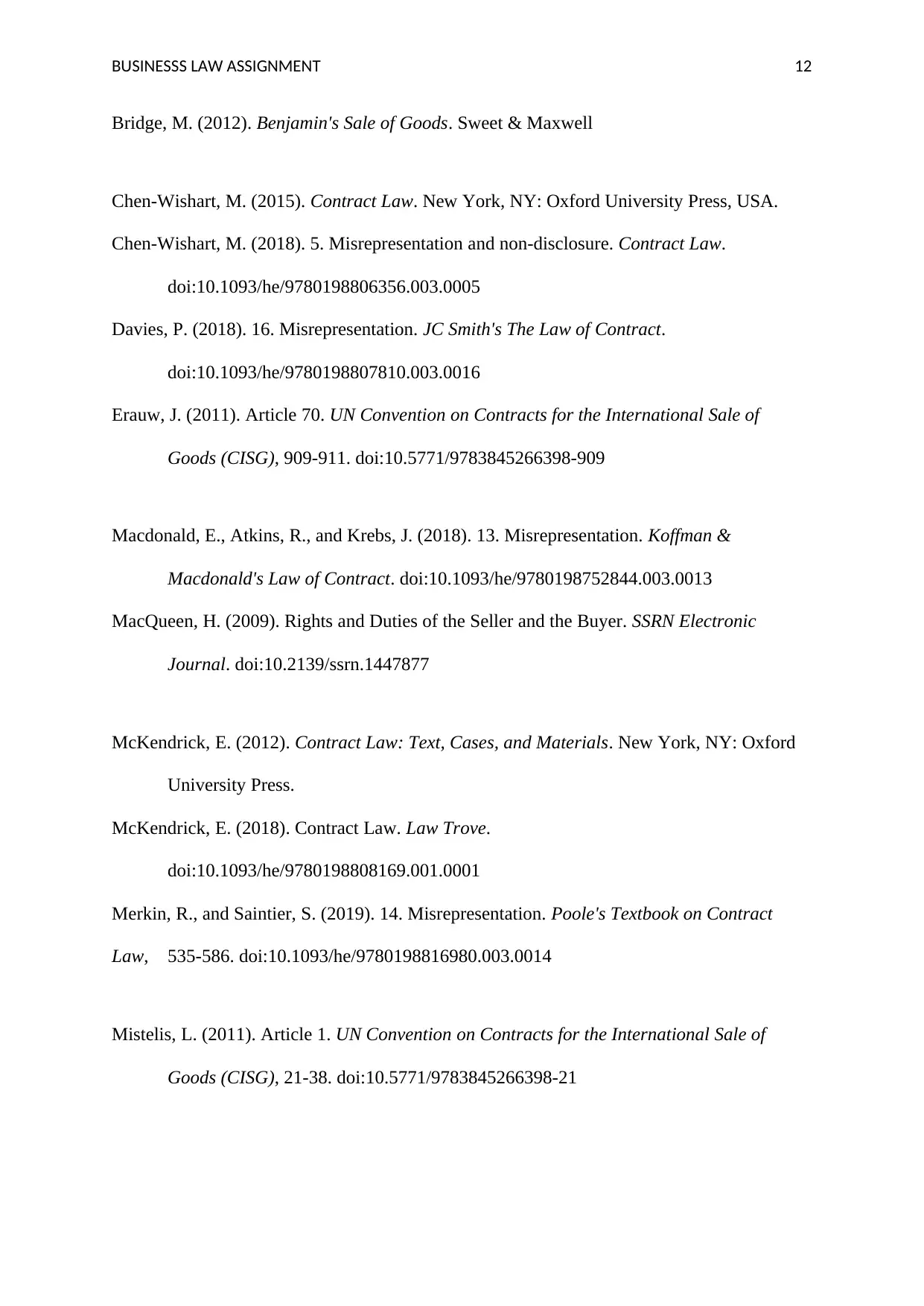
BUSINESSS LAW ASSIGNMENT 12
Bridge, M. (2012). Benjamin's Sale of Goods. Sweet & Maxwell
Chen-Wishart, M. (2015). Contract Law. New York, NY: Oxford University Press, USA.
Chen-Wishart, M. (2018). 5. Misrepresentation and non-disclosure. Contract Law.
doi:10.1093/he/9780198806356.003.0005
Davies, P. (2018). 16. Misrepresentation. JC Smith's The Law of Contract.
doi:10.1093/he/9780198807810.003.0016
Erauw, J. (2011). Article 70. UN Convention on Contracts for the International Sale of
Goods (CISG), 909-911. doi:10.5771/9783845266398-909
Macdonald, E., Atkins, R., and Krebs, J. (2018). 13. Misrepresentation. Koffman &
Macdonald's Law of Contract. doi:10.1093/he/9780198752844.003.0013
MacQueen, H. (2009). Rights and Duties of the Seller and the Buyer. SSRN Electronic
Journal. doi:10.2139/ssrn.1447877
McKendrick, E. (2012). Contract Law: Text, Cases, and Materials. New York, NY: Oxford
University Press.
McKendrick, E. (2018). Contract Law. Law Trove.
doi:10.1093/he/9780198808169.001.0001
Merkin, R., and Saintier, S. (2019). 14. Misrepresentation. Poole's Textbook on Contract
Law, 535-586. doi:10.1093/he/9780198816980.003.0014
Mistelis, L. (2011). Article 1. UN Convention on Contracts for the International Sale of
Goods (CISG), 21-38. doi:10.5771/9783845266398-21
Bridge, M. (2012). Benjamin's Sale of Goods. Sweet & Maxwell
Chen-Wishart, M. (2015). Contract Law. New York, NY: Oxford University Press, USA.
Chen-Wishart, M. (2018). 5. Misrepresentation and non-disclosure. Contract Law.
doi:10.1093/he/9780198806356.003.0005
Davies, P. (2018). 16. Misrepresentation. JC Smith's The Law of Contract.
doi:10.1093/he/9780198807810.003.0016
Erauw, J. (2011). Article 70. UN Convention on Contracts for the International Sale of
Goods (CISG), 909-911. doi:10.5771/9783845266398-909
Macdonald, E., Atkins, R., and Krebs, J. (2018). 13. Misrepresentation. Koffman &
Macdonald's Law of Contract. doi:10.1093/he/9780198752844.003.0013
MacQueen, H. (2009). Rights and Duties of the Seller and the Buyer. SSRN Electronic
Journal. doi:10.2139/ssrn.1447877
McKendrick, E. (2012). Contract Law: Text, Cases, and Materials. New York, NY: Oxford
University Press.
McKendrick, E. (2018). Contract Law. Law Trove.
doi:10.1093/he/9780198808169.001.0001
Merkin, R., and Saintier, S. (2019). 14. Misrepresentation. Poole's Textbook on Contract
Law, 535-586. doi:10.1093/he/9780198816980.003.0014
Mistelis, L. (2011). Article 1. UN Convention on Contracts for the International Sale of
Goods (CISG), 21-38. doi:10.5771/9783845266398-21
⊘ This is a preview!⊘
Do you want full access?
Subscribe today to unlock all pages.

Trusted by 1+ million students worldwide
1 out of 14
Related Documents
Your All-in-One AI-Powered Toolkit for Academic Success.
+13062052269
info@desklib.com
Available 24*7 on WhatsApp / Email
![[object Object]](/_next/static/media/star-bottom.7253800d.svg)
Unlock your academic potential
Copyright © 2020–2025 A2Z Services. All Rights Reserved. Developed and managed by ZUCOL.





